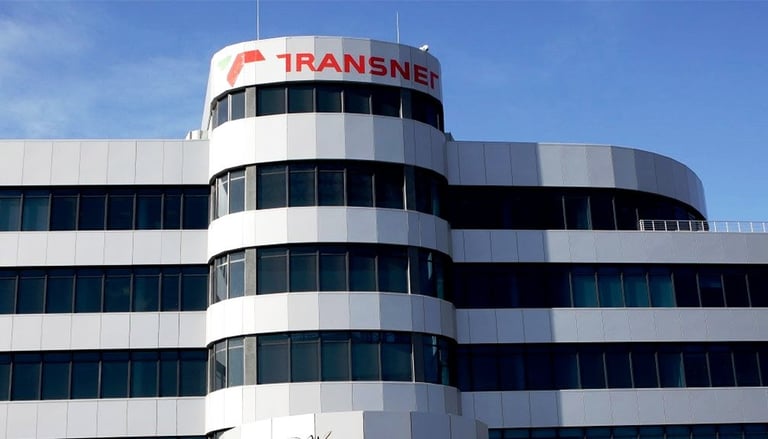Transnet Secures R51 Billion Government Guarantee to Strengthen Africa’s Trade Gateway
Transnet secures R51B gov guarantee to stabilize finances, refinance R138B debt, and boost SA’s trade gateway role. Tied to reforms, it aims to fund infrastructure but faces operational and governance hurdles. Success hinges on modernization and private partnerships.
RAILWAY TRANSPORTATIONLOGISTICS
Trevor Gozhi
6/8/20253 min read


South Africa’s state-owned logistics giant, Transnet SOC Ltd., has been granted a R51 billion ($2.8 billion) government guarantee facility, announced by Transport Minister Barbara Creecy on May 22, 2025, to strengthen its role as a sustainable and efficient gateway into Africa. Approved with the concurrence of the Minister of Finance, Enoch Godongwana, this financial lifeline aims to stabilize Transnet’s operations, support its capital investment program, and address its substantial debt obligations.
In a statement, Transnet welcomed the guarantee, emphasizing its critical role in ensuring the company’s sustainability and fostering long-term economic growth. “The facility will enable Transnet to refinance maturing debt and ensure the organization’s continued access to adequate resources and facilities to continue its operations as well as fund the capital investment programme for the foreseeable future,” said Dave Watts, a maritime consultant.
The R51 billion package comprises a R41 billion loan guarantee to cover funding needs for the 2025/26 and 2026/27 financial years and a R10 billion guarantee to manage liquidity for servicing maturing debt and financing capital investments. This follows a R47 billion guarantee provided in 2023, highlighting the government’s ongoing commitment to stabilizing the embattled logistics entity. However, the guarantee comes with stringent conditions, requiring Transnet to meet operational and logistics-sector reform milestones to access the funds.
Transnet’s financial struggles are well-documented. As of March 2024, its debt stood at approximately R138 billion, with annual debt servicing costs of R14–15 billion. The company reported a widened first-half loss of R2.2 billion for the six months ending September 2024, compared to R1.6 billion the previous year, driven by operational challenges, including declining container and petrol volumes, equipment shortages, and maintenance backlogs. Rail inefficiencies alone cost the South African economy over R400 billion in 2022, while the nation’s ports rank among the least efficient globally, losing market share to competitors on the continent.
The guarantee is intended to alleviate immediate financial pressures, enabling Transnet to refinance maturing debt, which was reported to be around R120 billion earlier in 2025. Investment in infrastructure—such as repairing half of the 1,000 locomotives purchased from China Railway Rolling Stock Corporation, many of which are currently out of service—and modernizing port and rail facilities is expected to drive volume and revenue growth. These improvements could reduce Transnet’s debt burden over time and enhance South Africa’s global trade competitiveness.
However, the bailout has sparked debate. Moody’s Ratings warned in May 2025 that without urgent operational improvements, the guarantee may only delay a financial crisis, leaving taxpayers liable for billions in debt. Critics argue that Transnet’s challenges—rooted in years of mismanagement, graft, and criminal threats like cable theft and vandalism—require more than financial injections. The Zondo Commission previously highlighted billions siphoned through irregular procurement, underscoring the need for governance reforms.
On the reform front, Minister Creecy emphasized that the guarantee is tied to “clear reform milestones” outlined in the Freight Logistics Roadmap. Transnet is collaborating with the National Treasury and the Presidency to develop a joint policy for private-sector investment in priority freight corridors, signaling a shift toward public-private partnerships. In December 2024, Transnet issued terms for third-party access to its rail network, a move aimed at boosting efficiency and attracting investment. These efforts align with broader government goals to modernize South Africa’s transport and logistics sectors, which are critical for inclusive economic growth.
Despite these initiatives, challenges persist. Transnet’s rail freight volumes for the year ending March 2025 are projected to reach only 160–165 million tons, falling short of the 170 million-ton target set in its recovery plan. Labor tensions also loom, with the United National Transport Union (UNTU) in urgent talks to avert a strike over stalled wage negotiations.
Proponents of the guarantee, however, see it as a pivotal step. A post on X by @RailwaysAfrica
described the facility as a “pivotal moment” for South Africa’s logistics infrastructure, noting its potential to stabilize finances and drive long-term reforms. If Transnet successfully executes its capital projects and attracts private-sector participation, experts suggest it could unlock billions in economic value and improve South Africa’s global trade logistics rankings.
The R51 billion guarantee underscores Transnet’s central role in South Africa’s economy, from ferrying iron ore and coal exports to facilitating imports at its eight commercial ports. Yet, its success hinges on addressing deep-seated operational and governance issues. As the government balances fiscal constraints—having spent over R520 billion on state-owned enterprise bailouts since 2009—with the need for economic growth, Transnet’s turnaround remains a high-stakes endeavor for the nation.
Future
© 2025. All rights reserved.


